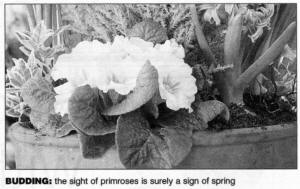
Primroses and bees herald start of spring
by Paul Cormacain

MY friends on Rathlin tell me of the primroses there. I was thinking that if there were two reported sightings there must be many more sightings unreported. Also, on a comparatively isolated spot like Rathlin there must be many more primroses about. Perhaps some of them are never seen, "born to blush unseen, and waste their sweetness on the Rathlin air".
We have only seen primroses once this year, but I am sure that if we looked more diligently we could find plenty of these delightful flowers, the harbingers of spring. The only problem of early primroses is in the reproduction. The flowers need insects as part of the reproductive process, and in early February there are not very many insects about. So it is highly possible that early flowers will not reproduce for next year.
The good folk of Rathlin produce a monthly news-sheet which we have been getting for years. On their most recent sheet they tell of the sighting of a little auk. This is a bird I have never seen, but would dearly love to. The little auk also gets `dovekie", but I do not know the language or languages of origin of that name. It is a regular visitor to the Shetlands in Scotland, and if the weather is very severe it may turn up on the eastern seaboard of Scotland. I have not heard of one on Rathlin before.
The little auk is the smallest of the auk family, usually not longer than 20cms. With that size, I wonder how it keeps warm in the Arctic weather because the smaller the creature the more difficult it is to heat. At this time of the year it has blue black upper parts and white under parts. Its wings are brown, with the secondaries tipped with white. The throat, cheeks and sides of the neck are white. There is a colour change for the summer and breeding time. Then the throat and foreneck become sooty brown. The black bill is short, stout and curved and the legs and feet are a dark blue grey. They are very distinctive birds, but because most of us see them so seldom or never that we must take care in identifying them.
I have just come across some research which states that the dovekie does visit Ireland, and can be seen in Antrim and Donegal. Further south it has also turned up in Sligo and Dublin, and elsewhere in lesser numbers. It must be remembered that the little auk is usually found far from land, and it only comes to shore in the breeding season. Then other records tell me that the bird has been sighted in England in the summer time. It turned up in Derby in May, it must have been really lost. It also turned up in Norfolk in July, Northumberland in May, and in Devon in August. And would you believe it, there is a record for its appearance in Ulster in May and August. I must keep an eye open for it in future.
The breeding range of the dovekie is within the High Arctic, where it must be the most abundant of all the auk family. Some areas have hundred of thousands of the birds, according to explorers and ornotholgists who have visited there. Other breeding sites we would know about by name include Spitsbergen, Bear Island, Jan Mayan and Novaya Zemla. Its' nearest breeding spot to us is on Grimsey Island, north of Iceland, so it is not exactly a close neighbour Auks are fascinating, but I must tell you that I have just seen a bee in the garden. Unable to get close enough to identify it, unfortunately, but what ever it is has just woke up from her winter sleep and is now thinking about setting up a nest. I have heard of a ladybird in Co Down, and already reports are coming in of butterfly sightings. Must be spring
COMING EVENTS
Sunday, February 20: National Trust is organising a meal and walk at Mount Stewart, more details from 028 9751 0721.
Thursday, February 24: Birdwatch Morning at Castle Espie, at 11.30am, Tel: 028 9187 4146.
Monday, February 28: Lisburn RSPB will hear about Sea Bird Detective Stories from Anthony McGeehan, at 7.30pm in Friends Meeting House. Call Peter Galloway on 028 9266 1982.
Sunday, March 6: The Dinosaurs of Colin Glen, an exploration of the geology of the glen, at l lam, at Colin Glen Forest Park, more from 028 9061 4115.
Friday to Sunday, March 11-13: Birdwatch Ireland and the RSPB are holding their annual Wildlife Conference in the Killyhevlin Hotel outside Enniskillen, information from 028 9069 0843.
Wednesday, March 16: The future for Divis Mountain, 7.30pm, at Belfast Castle, phone 028 9060 34.
Ulster Star
12/02/2005
